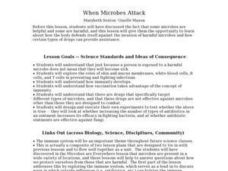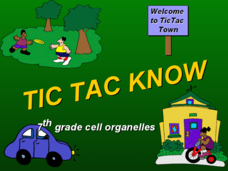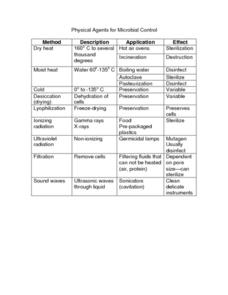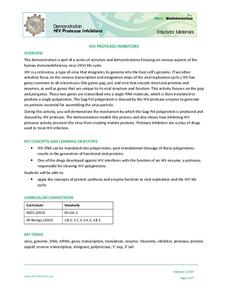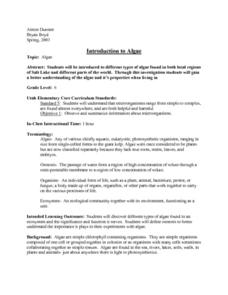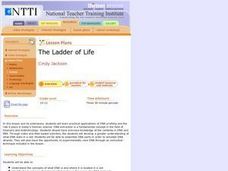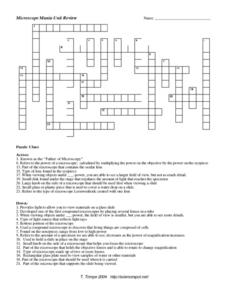Curated OER
Student Cancer Journals -- Personal Reflections and Research on Life and Death Issues
Concepts learned in the study of mitosisand biochemistry help when making life or death decisions. Compile a notebook or portfolio of work related to the project can make the research more organized and relevant.
Virginia Department of Education
DNA Extraction from Strawberries
Has your class ever been astounded by the complexity of DNA analysis? Have they ever asked why genetic engineering has become so important to our daily lives? Young scientists perform DNA extraction on strawberries and explore how the...
Curated OER
When Microbes Attack
Learners study how the body defends itself against the invasion of harmful microbes and how certain types of drugs can provide assistance. They design and execute their own experiments to test whether increasing the number of types of...
Curated OER
Tic Tac Know: organelles
Tic-Tac-Toe is a game most students will be familiar with. This fun activity prompts students to answer questions about cells organelles in order to place a mark on the grid. There are some non-essential humorous sound effects and...
Curated OER
Beef and Beef By-Products
Learners examine the various types of beef and the many uses of its by-products. They increase their knowledge by playing a game of "beef bingo."They discuss what parts of beef animals are their by-products.
Curated OER
Physical Agents for Microbial Control
In this biology worksheet, students take part in an examination of the graphic organizer to determine the different types of environments and how they effect the survival of microbes.
Curated OER
Ready for Roots
Fourth graders sort seeds and predict what conditions are needed for them to germinate. They keep the seeds moist, observe and measure their growth and graph the results. As the seeds start to grow students compare and contrast the each...
Biology Junction
Seed Plants: Gymnosperms and Angiosperms
One of the reasons plants found success on land relates to seed development. Scholars learn about many different forms of seeds and how they changed over time. It describes the structure and function of many different types of seeds in...
Curated OER
Matching Flowers With Their Pollinators
Students match flowers to pollinators and construct models of
flowers to demonstrate why different kinds of flowers need different kinds of
pollinators. They use their flower models and the "Scientific Method Format" included in the...
Howard Hughes Medical Institute
HIV Protease Inhibitors
How do doctors fight a virus that's constantly mutating? Show science scholars how we fight HIV using one of its own most fundamental processes through a thoughtful demonstration. The lesson focuses on how protease inhibitors prevent HIV...
National Nanotechnology Infrastructure Network
The Micro and Macro World Around Us
Don't let your eyes play tricks on you ... use scale to keep your eyes in check! Young scholars observe images without scale and try to identify the structure. Then, they look at the same image with a scale bar and assess whether their...
Teach Engineering
Exploring Acceleration with an Android
Small groups use rubber bands to accelerate an Android device along a track of books. They collect the acceleration data and analyze it in order to determine the device's velocity.
Community Resources for Science
A Whole New World of DNA and Proteins
Lead your young scientists into an exciting world as they participate in a role play and experiment focused on proteins and DNA. After researching the Central Dogma of Biology, individuals or groups participate in a classroom slide...
Curated OER
Toxic Transmission
Students read article, "Toxic Transmission" and discuss technology pollution, specifically cell phone pollution and its ripple effects in other parts of the world.
Curated OER
Introduction to Algae
Students explore different types of algae found in both local regions of Salt Lake and different parts of the world. They discover different types of algae found in an ecosystem and the significance and function it serves.
Curated OER
The Ladder of Life
Students explain the concepts of what DNA is and where it is located in a cell, identify the two types of molecules that make up the rungs of a DNA molecule and identify the two types of Purine and Pyrimidine molecules
Curated OER
Colorful Fractions
Young scholars use charts to show fractions. In this fractions and percents lesson, students review fractions, percents and ratios. Young scholars create tables and color the cells to make different fractions. Students answer...
Curated OER
CONVECTION
Students experiment to produce a visual convection current in the classroom and compare it to the images taken of convection cells in the Sun. They analyze the source of the Sun's energy and this type of energy transport.
Curated OER
Donating Blood
Students examine the facts of blood and discuss the different parts of blood and their function. They discover different people have different blood types and where they can go to donate blood.
Curated OER
Cellular Respiration
In this cellular respiration learning exercise, high schoolers answer 34 questions in a variety of types including fill in the blank, short answer and matching. All questions focus on specific parts of the respiration process.
Curated OER
The Euglena and Spirogyra
In this Euglena and Spirogyra worksheet, students read about these two Protozoans and they answer fourteen questions about their specified structures and functions. They color a diagram of Euglena and Spirogyra and label their parts.
Curated OER
Microscope Mania Unit Review
In this microscope worksheet, students complete a crossword puzzle given twenty three hints about the parts of a microscope, the magnification of a microscope and the types of microscopes.
Curated OER
Biology - Virus Modeling
High schoolers research one of the many types of viruses. They create a 3-D model of the virus they researched with graphics software.
Curated OER
PARAMECIUM RESPONSES TO STIMIULI
Students design the test they use to examine, how the paramecium move, feed, and react to different types of stimuli such as a drop of vinegar. They conduct a lab experiment using a microscope.




